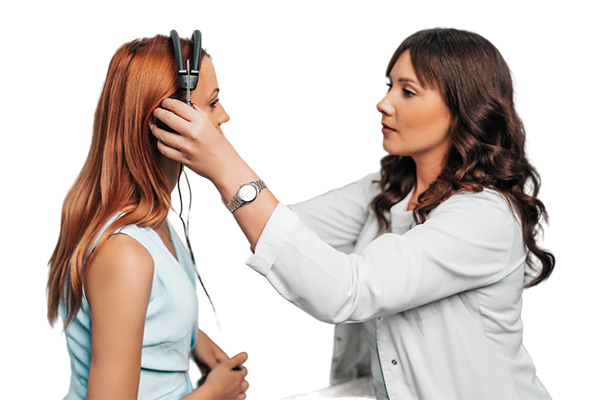Hearing Tests
Schedule your hearing test at a nearby clinic or book a home visit for ultimate convenience!

Do I Need a Hearing Test?
Are you experiencing difficulties with your hearing? It might be time to consider a hearing test. Ask yourself the following questions to see if you might benefit from one of our free assessments:

Do you feel stressed out in social situations because you can’t follow the conversation?

Are you constantly turning up the TV volume, while others find it too loud?

Do you find it challenging to hear conversations in noisy environments?

Is chatting on the phone difficult, even in a quiet room?

Do you feel stressed out in social situations because you can’t follow the conversation?

Are you constantly turning up the TV volume, while others find it too loud?
If any of these issues seem familiar, there may be an underlying problem. However, it doesn’t necessarily mean you have hearing loss; there could be many causes, such as earwax buildup or other medical conditions. The most important thing is to make sure, so why not book an appointment today?
What Happens
at a Hearing Test?
Are you experiencing difficulties with your hearing? It might be time to consider a hearing test. Ask yourself the following questions to see if you might benefit from one of our free assessments:
The Hearing Test Process
Understand Each Step of Your Hearing Assessment
STEP 1: Medical History & Discussion
Our hearing assessment begins with a detailed discussion of your medical history. We take the time to understand any past or present ear conditions, hearing difficulties, and other health factors that may influence your hearing. This conversation allows us to tailor the testing process to your unique needs, ensuring a thorough and personalised evaluation.
STEP 2: Video Otoscopy
Next, we perform a video otoscopy, where we visually examine your ear canal and eardrum using a tiny camera. This step lets us check for any blockages, earwax buildup, or abnormalities that might affect your hearing. The video otoscopy provides a clear view of your ear health, which we can share with you on-screen during the exam.
STEP 3: Full In-Depth Hearing Test
This comprehensive test measures your hearing sensitivity across various pitches and volumes. We use both air conduction (via headphones) and bone conduction (via a bone oscillator) to assess how well you hear different frequencies. The results are plotted on an audiogram, showing your hearing ability at different sound levels. This test helps us determine if your hearing falls within the normal range or if there's any degree of hearing loss.
STEP 4: Middle Ear Test
In this step, we conduct a tympanometry test to evaluate the function of your middle ear, including your eardrum and the tiny bones that help transmit sound. This test measures how your eardrum responds to changes in air pressure, helping us identify issues such as fluid in the ear or problems with the eardrum. It's a critical part of detecting conditions that could be affecting your hearing.
STEP 5: Speech-In-Noise Test
The speech-in-noise test assesses how well you can understand speech in noisy environments, which is often a challenge for those with hearing difficulties. This test simulates real-world listening conditions, helping us understand how your brain processes speech amid background noise. It’s an essential step for identifying specific challenges you may face in everyday life.
STEP 6: Hearing Summary, Report & Recommendations
After all tests are complete, we review the results with you in detail. We’ll explain your audiogram, which shows your hearing loss in terms of frequencies and decibels. We’ll also discuss the type, pattern, and degree of hearing loss you may have and how it affects your daily life. Based on these findings, we’ll provide tailored recommendations for next steps, whether it be monitoring, medical intervention, or hearing aids.
STEP 7: Hearing Aid Demonstration
If hearing aids are recommended, we’ll give you the opportunity to experience their benefits firsthand. We’ll demonstrate how different hearing aids can improve your hearing in various situations. Using real ear measurement (REM) technology, we ensure the devices are finely tuned to your specific hearing needs. This step helps you make an informed decision, ensuring you choose the hearing aids that best match your lifestyle and preferences.
Online Hearing Test
Not sure if you need to book a hearing assessment? Try our online hearing test. It’s quick, easy, and gives you an initial insight into your hearing health, helping you decide whether a professional test would be beneficial.
Frequently Asked Questions
How long is a hearing test?
We allow up to 90 minutes for a hearing assessment.
This gives us time to get to know the clients’ daily issues with their hearing loss, to perform video otoscopy and to perform a hearing test. We can then discuss what a hearing aid could potentially achieve, covering sizes of hearing aids available and technology level. Once we reach an agreement on the above, then sizing of the ear is performed, or impressions taken to build the hearing aids from.
At Hear4U our custom moulds are scanned into a machine which then sends the moulds straight to the manufacturer saving about 2-3 days of postage time and speeds up the process for delivery.
What is an audiogram?
The audiogram, in layman’s terms, is the measurement of the quietest sounds you can audibly hear.
When a hearing test is performed, it is usually in a very quiet room if not a sound-proof booth. This will ensure no intrusion of sound around you. You will then have a sound presented in one ear at a certain frequency and a certain volume to see if you can hear it.
If you do respond by pressing a button or saying yes, the next sound is then produced, slightly quieter, until you can’t hear it anymore and then the audiologist will just bring it back into your audible range (and this is seen as your hearing level on that ear, at that frequency). This is then performed across both ears at a number of frequencies to give us a complete range.
Once this is done the audiologist will ascertain what type of hearing loss you have by performing further assessments.
Do you do free hearing test home visits?
We do offer free hearing tests from the comfort of your own home! One of our specialised audiologists will be able to assist you with their equipment to ensure you receive the best care possible.
What causes hearing loss?
Hearing loss can result from various factors, including aging, exposure to loud noises, infections, genetics, and certain medications. It can also be caused by earwax buildup, injuries, or diseases such as Meniere’s disease. Understanding the cause is crucial for effective treatment and management.
What should I bring to my hearing test appointment?
Bring a list of your current medications, any previous hearing test results, and details about your hearing issues. If you already use hearing aids, bring them along with their case and batteries. Having a friend or family member with you can also be helpful.




